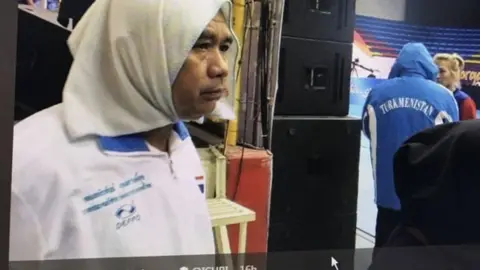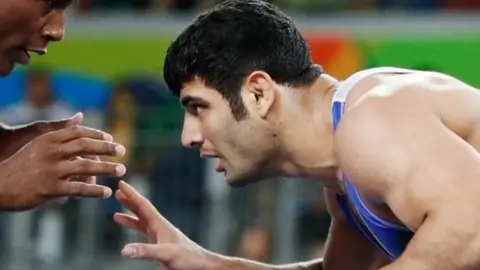What happens when sport and politics collide in Iran
 EPA
EPAAs Iranian sports fans sat down to watch the 2018 Fifa World Cup draw from Moscow last Friday, it was not just the fate of the their national team that was on their minds. Many were also waiting to see what the draw's Russian co-host, Maria Komandnaya, would be wearing.
Would Iranian TV censors consider her outfit modest enough to show the whole draw? Or would they cut her out, as they did when Brazilian TV host Fernanda Lima hosted the 2014 draw, forcing fans to miss crucial bits of the programme?
Much to everyone's relief, Ms Komandnaya's high V-necked black dress passed muster.
Although Iranian fans could have wished their team had ended up in an easier group, at least the news that Iran would be playing Spain, Portugal and Morocco came uninterrupted.
"Iran, are you happy?" Ms Komandnaya tweeted after a week in which she was deluged with requests from Iranians on social media begging her to dress demurely.
"Thank you!" came the many replies.
But football was not the only arena in which sport and politics clashed in Iran in recent days.
Headscarf hubbub
Two other high-profile cases also hit the headlines - one involving wrestling and the second a South Asian team sport called Kabaddi.
In both cases sensitivities that had nothing to do with sport caused uproar in Iran and a headache for the international sporting federations concerned.
The first incident happened in the northern Iranian city of Gorgan at the 2017 Women's Asian Kabaddi Championships.
 Twitter/ICHRI
Twitter/ICHRIAll was going well until a photograph appeared on social media showing the male coach of the Thai national team watching his team play, wearing what appeared to be an Islamic-style headscarf.
Somprach Phonchoo was snapped first with a small white gym towel on his head, and then later on with a proper black headscarf.
Men are not permitted to watch female sporting events in Iran, but Coach Somprach said he was told he could stay with his team if he wore a headscarf, "as a sign of respect".
"All male coaches were told they were required to wear the headscarf," he told BBC Thai. "Not just me."
The Iranian organisers of the event strongly denied giving any such advice, and the incident prompted a storm of comment, and much amusement, on Iranian social media.
A journalist working for Iran's reformist Shargh newspaper jokingly described Coach Somprach's plight as "the first instance of violence and discrimination against men in Iran".
Talking point
But joking aside, the story has once again highlighted the contentious issues of mandatory hijab (head covering) for women in Iran, and the restrictions which the country's strict Islamic laws put on women taking part in sport or watching men's sporting events.
"I hope the Thai coach is using this as a sign of protest against Iran's compulsory hijab requirements," Instagram-user Azadeh wrote on BBC Persian's account.
"This law has deterred many international female athletes from coming to Iran, and deprived female Iranian athletes of the chance to compete internationally."
"I admire the Thai coach for this clever gesture," said Rose, a BBC Persian viewer.
"He is taking a swipe at Iranian authorities for whom the only sporting priority is stopping women from going to stadiums. It's only fair to be mocked for such backward policies."
The Iranian Federation of Kabaddi says it will refer the incident involving Coach Somprach to the World Kabaddi Federation, but it is yet to file an official complaint.
'Foolish politicians'
The second case involved one of the most popular sports in Iran - wrestling.
At the Under-23 World Wrestling Championship in Poland freestyle Iranian wrestler Alireza Karimi-Machiani was all set for a comfortable victory over his Russian opponent, when he was suddenly ordered by his coach to lose the match.
The reason was that victory would have meant him facing an Israeli wrestler in the next round.
 AFP
AFPThe Islamic Republic calls for Israel's eradication and forbids Iranian athletes from competing against Israeli nationals.
"I have been training hard for months to win a gold medal, and it would have been easy for me to win," Mr Karimi-Machiani said after the match.
"I could have become a world champion, but this policy acted as a hurdle."
Iranian social media users expressed outrage over the episode.
"Shame on a government that tramples so easily on the pride of a young athlete only to bolster its own power," said one BBC Persian viewer. "If this happens again, Iran should be banned."
Others saw the incident as a reflection of wider problems.
"Please stop shouting 'you have to lose'," said Twitter user Azadeh Assadi. "We have been losing for years to ignorance, hatred, revenge, enforced religion, wrong policies, unnecessary but compulsory rules, and foolish politicians."
'Pointless act'
In a sign of just how angry many Iranians were over Mr Karimi-Machiani throwing his match, the head of Iran's Wrestling Federation made an outspoken intervention.
"The world isn't going to say Karimi didn't participate in the match to protest against Israel and show support for Palestine," Rasoul Khadem, an Olympic gold medal winner, told the Etemad newspaper.
"Instead, everyone will talk about what they saw - how a Russian wrestler turned the odds against him, and won the match in the last minute with just six moves."
It was time, Mr Khadem said, for a new strategy on competing against Israelis.
Meanwhile Iran's sports ministry said it would pay Mr Karimi-Machiani compensation for losing the match, and United World Wrestling - the sport's international governing body - is investigating the incident.
